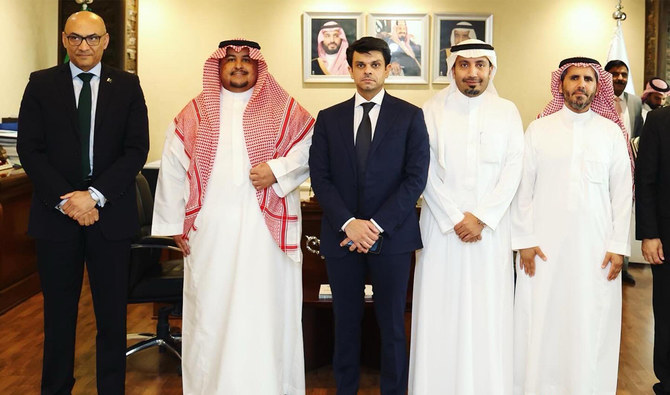ISLAMABAD: Special Assistant to the Prime Minister (SAPM) on Overseas Pakistanis and Human Resource Development, Jawad Sohrab Malik, on Sunday met the chairman of one of the leading business conglomerates in Saudi Arabia to explore and seek employment opportunities for Pakistanis, a government handout said.
Malik is on a special visit to Saudi Arabia this month to explore and unlock employment avenues for Pakistani professionals, focusing on development projects that could open up jobs for skilled, semi-skilled and unskilled workers. During the visit, Malik has signed agreements with multiple Saudi recruitment agencies and companies.
On Sunday, he held a meeting with Rashid Saad Al-Rashid, chairman of the Al-Rashid Group of Saudi Arabia.
“Malik thanked the chairman for hiring a significant number of Pakistani workers. He specifically requested the Al-Rashid Group to hire more Pakistani workers for their projects,” the overseas Pakistanis ministry said in a statement. “He also assured full cooperation in recruitment from Pakistan. Both heads agreed to further strengthen cooperation.”
“I am grateful for the chairman’s commitment to hiring Pakistani workers and his willingness to consider further recruitment from Pakistan,” Malik was quoted in the statement as saying. ” I am confident that this meeting will lead to a stronger partnership between Pakistan and the Al-Rashid Group.”
The chairman of the group said the company had a “long and positive history” of working with Pakistani companies and workers and valued their contributions to its projects:
“We are committed to continuing to hire Pakistani workers in the future. We are also open to exploring new areas of cooperation with Pakistan.”
On Saturday, Malik met with the CEO of Saudi Arabia’s Dallah Healthcare Company, Dr. Ahmad Bin Saleh Babaeer, and VP (HR) of Dr. Sulaiman Al-Habib hospitals, Mr. Badr Al Rowaili, the Pakistani ministry said.
“The two hospitals are the leading health care service providers in Saudi Arabia having a number of ongoing expansion projects across the Kingdom. They expressed their satisfaction and recognized the work quality of Pakistani doctors, nurses and paramedical staff working in their hospitals,” the Pakistani overseas ministry said in a statement.
“They further expressed their keen interest in more recruitments from Pakistan and agreed on developing training and orientation mechanisms for Pakistani health care professionals in order to effectively engage them in the Saudi health care sector.”
The engagement with the two key players from the Saudi health care sector would be beneficial for the training and orientation of Pakistani professionals and create job opportunities for them in the Kingdom, the statement added.
During Malik’s visit, agreements and letters of intent have been signed with multiple Saudi recruitment agencies including The First National Company (FNRCO) and Maharah Human Resources. Last week, Malik also signed a letter of intent (LOI) with the Saudi-based global conglomerate, Al Bawani Holdings, to unlock jobs for Pakistani expats.
Malik has also invited Takamol, a Saudi initiative to develop human capital, to open more testing and training centers in Pakistan and offered full cooperation to the company to operate as an independent training and certification company in Pakistan.
“Further, [Saudi] TVTC (Technical and Vocational Training Corporation) can also collaborate for training initiatives in Pakistan,” the SAPM was quoted as saying in a statement released last Tuesday. “[Pakistan’s] NAVTEC (National Vocational and Technical Training Commission) and TVTC shall sign MOU very soon.”
The Pakistan Overseas Employment Corporation (POEC) and NESMA & Partners, a leading contracting company in Saudi Arabia, have also signed an agreement to export manpower to the Kingdom.
The “landmark” agreement will allow the export of skilled Pakistani labor to Saudi Arabia, specifically for ongoing and upcoming projects of NESMA, which specializes in construction.
The Kingdom is home to the largest number of Pakistani expats, over two million, and is the biggest contributor to remittance inflows to the South Asian nation.















